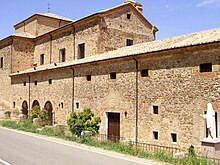Convent


A convent ( m. , From Latin conventus , 'assembly') is a branch of a religious order consisting of female or male religious ( nuns , monks , friars or sisters ). Both the totality of the members of such a community and the buildings in which the community lives can be called a convent .
The term came into use when the hermitic way of life was combined with the coenobite way of life in church history . The hermits of the Eastern Church Lauren , who lived in individual cell houses or caves around the church and the cell of their superior, were called Conventus . The term was in common use early in the Western Church .
With regard to the living area of a monastery, convention refers strictly to the monasteries of celibate orders, especially the mendicant orders , not to a congregation . Another name for the living area of the monastery, which is reserved for the residents of the convent, is "enclosure".
In a narrower sense, convention refers to the assembly of the conventuals , the voting members of the community. All members of a monastery community who have made solemn profession are entitled to vote . In monastic orders, conversations and lay sisters did not belong to the convent; however, the Second Vatican Council abolished this distinction in favor of a “fraternal bond among the members” and “a single class of sisters”.
In the case of communities of religious sisters whose way of life is not tied to a specific monastery, one speaks of settlement.
See also
Individual evidence
- ^ Karl Suso Frank : Convent . In: Walter Kasper (Ed.): Lexicon for Theology and Church . 3. Edition. tape 6 . Herder, Freiburg im Breisgau 1997.
- ^ George Cyprian Alston: Convent . In: Catholic Encyclopedia , Volume 4, Robert Appleton Company, New York 1908.
- ↑ Manfred Heim: From indulgence to celibacy: Small encyclopedia of church history. (= Beck'sche Reihe. Volume 1857), CH Beck, Munich 2008, ISBN 978-3-406-57356-9 , p. 251 ( digitized version ).
- ^ Second Vatican Council: Decree on the modern renewal of religious life Perfectae caritatis , No. 15.